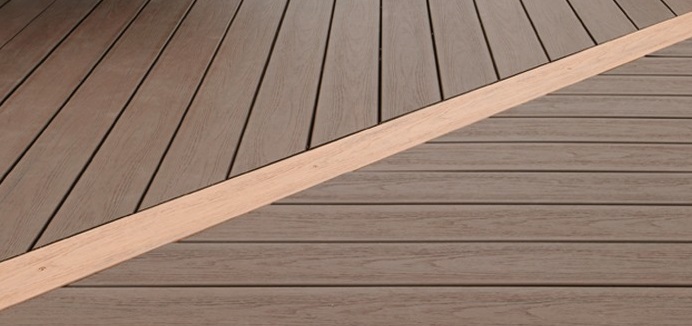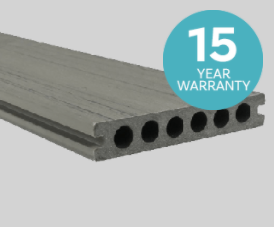
While many people know that composite decking is a beautiful, long-lasting alternative to traditional wood decking, few people know how composite deck boards are made. As the name suggests "composite" decking is made up of more than one element. Where traditional timber decking is made purely of wood, composite decking is made using a combination of hardwood fibres, polymer resin. The resulting boards offer superior strength, water-resistance and durability! Let's look a little bit closer at the way our composite decking is manufactured here at DeckPlus...
Our eco-friendly manufacturing process
One of the biggest misconceptions about composite decking is that it's bad for the environment because it contains plastics. In reality, the opposite is true! As outlined on our Eco-Friendly Decking page, a large proportion of the raw materials that make DeckPlus composite decking are recycled.
The wood fibres that we use are made using cut-offs of wood that would've otherwise ended up in landfill, and the plastics we use come from post-industrial and post-consumer sources. All of our composite decking is made responsibly so that we can offer you an eco-friendly alternative to timber decking.
You're probably thinking, how can timber decking be worse for the environment than composite - it's completely natural. Well, yes. Timber decking is completely natural, but herein lies the problem. In order for timber decking to be manufactured, thousands of trees are cut down each year, most of which are in tropical rainforests and other similar settings. Our composite decking doesn't contribute to deforestation and instead gives discarded wood a new lease of life!
How are composite deck boards made?
There are two different ways that composite deck boards can be made, by extrusion or by compression moulding.
Extrusion
The two main elements, wood fibres and polymer resin are combined with lubricants, foaming agents and colourant before being fed into an extrusion machine to create the desired shape. This method creates one long composite deck board on a conveyor belt that can be cut down to the required lengths later.
Compression moulding
Compression moulding is slightly different. Instead of feeding the raw materials into an extrusion machine, manufacturers tip the materials into a wood grain mould and compress them under extreme heat and pressure. This heat and pressure creates a strong physical bond that gives the boards their shape.
Different kinds of composite decking
Composite decking doesn't just come in one shape or size, you will see from the variety of ranges we offer on our website that composite decking can be hollow, solid, capped or uncapped. Each of these board types has its own unique qualities that make it suitable for different designs and budgets.

Hollow composite decking, like the boards in our EvoDek and FutureDek ranges, are perfect for homeowners that need a lightweight, budget-friendly option. Since these boards are made using less material, we can supply them at a lower price. The unique design of our hollow boards means that you're not compromising on structural integrity.
Hollow Boards >
Capped composite decking benefits from an additional polymer sleeve on top of the durable composite boards. This helps to make the boards highly-resistant to moisture and also preserves the colour and wood-grain finish for longer.
Read More: What does capped composite decking mean?
Capped Boards >
Whichever DeckPlus composite decking you choose, you can rest assured that it's been made responsibly and will last you for years to come. Take a look at our full range of decking, or give us a call on 0800 028 8756 to find out more.